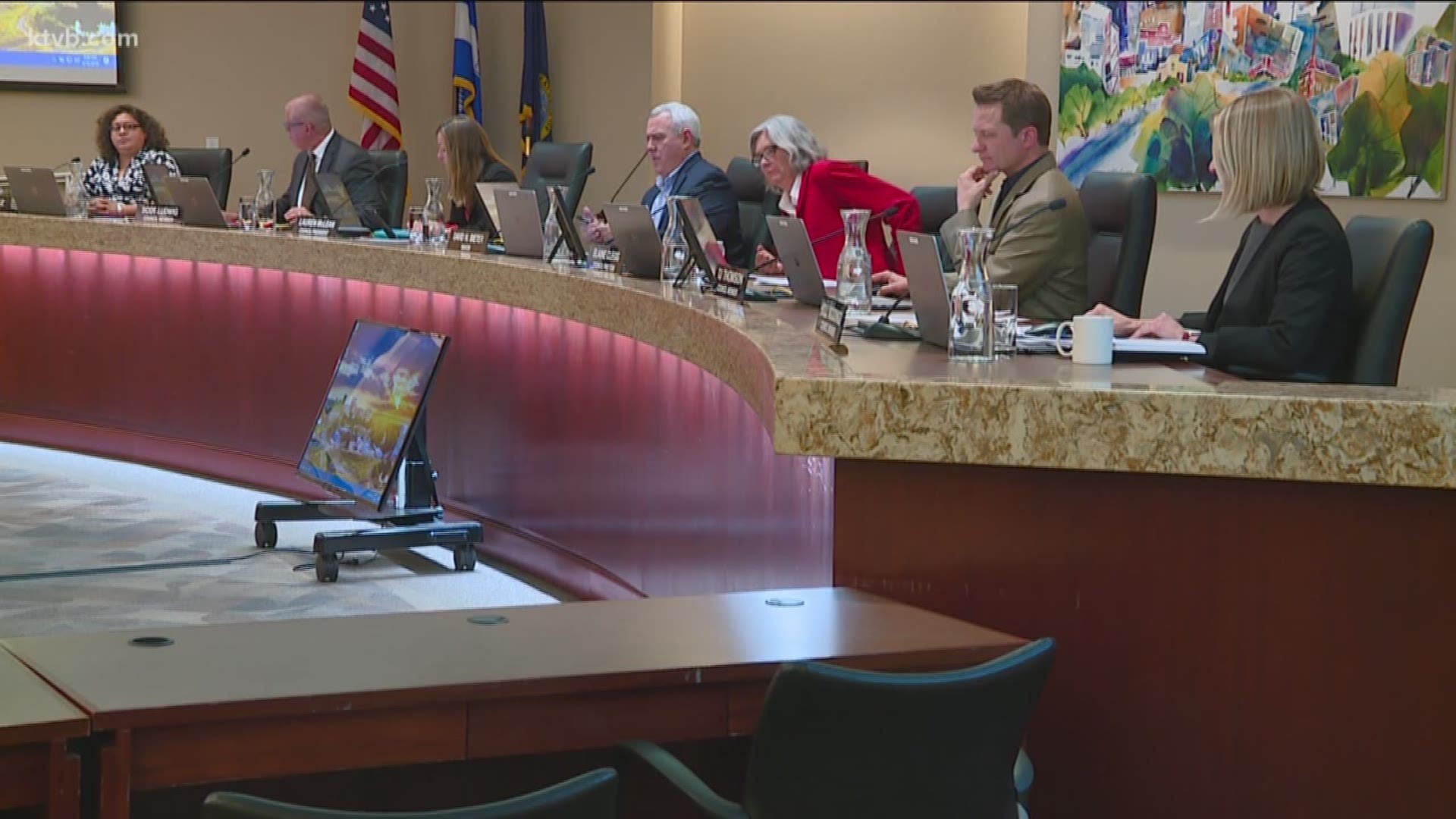BOISE, Idaho — The Boise City Council's meeting on Tuesday night was dominated by how the public and council want to fund public transportation as the bus system struggles to keep up with the city's growth. At the end of the public hearing, one thing was evident - people want a more reliable public transportation system.
The meeting also saw the City Council vote to approve the city's deal with the developers behind the proposed trucking terminal next to Blue Valley mobile home park in southeast Boise, their plans for the city to be powered by 100 percent clean energy by 2035, and hold a public hearing on a proposed ban on vaping in public spaces.
Public transportation funding testimony
The public hearing on the future of public transportation funding was the meeting's main focus after about a dozen people shared their thoughts on how to fund public transportation. They all had a clear message - find ways to improve public transportation.
The hearing started with a presentation by Valley Regional Transit and staff from the City of Boise on the current status of the bus system and how it compares to similarly sized cities.
Valley Regional Transit told the council how with more funding, it could enact their ValleyConnect 2.0 plan, which outlines what the service could become if it had the necessary funding.
Some of the improvements would include expanded routes and service times on the weekends, among other upgrades. However, Valley Ride would need millions of dollars in funding from the city for their service expansion and capital improvements on the roads across Boise that would help those services.
Following the presentation, Council Member Elaine Clegg spoke about how the city is not keeping up with the area's growth by only allocating less than five percent of the city's budget for public transportation. She added that there should be permanent funding sources for Valley Ride.
Mayor Dave Bieter and the City Council were in agreement that it would be extremely difficult for Valley Ride to achieve its ValleyConnect 2.0 plan with the city having just one funding option - through property taxes.
Bieter said a local tax could be a solution for the Treasure Valley's public transportation woes. The taxing option would allow residents to vote on a local sales tax that would be directed towards funding public transportation.
The issue is, under state law, only "resort towns" can utilize a local option tax, meaning Boise is not eligible.
MORE: Improved public transportation could ease Treasure Valley traffic congestion but faces challenges
The state also doesn't offer any funding for public transportation.
"There are two states in the country that don't have state funding for public transportation or a local option," Bieter said. "Idaho and Alabama are the only two."
All the city can do is funnel more of its general budget towards Valley Ride until the state legislature passes a bill that would allow it.
At the end of the hearing, Clegg requested a motion which sets a minimum of five percent of the city's general fund to go towards Valley Regional Transit this year and allocates $500,000 in funding for 2020 and 2021. The rest of the council were in support of the plan.
Council member Holli Woodings was in support of the motion, but also stated that Boise's neighboring cities would need to increase their own funding of VRT to help create a complete valley-wide bus system.
The motion was approved unanimously and will have a first hearing at a later meeting.
Bieter brought up how a light rail system could also help the city's public transportation options. He said he looked at how Salt Lake City and Denver built out their rail lines as successful examples of how to construct a public transportation system.
Land-swap deal and future energy plan approved
Before the public hearing on transportation, the council approved the land-swap deal between the city and the developers behind the proposed trucking terminal near Blue Valley mobile home park in southeast Boise.
The deal would have the city give RLR, the developers behind the proposed trucking terminal, a similarly sized parcel of land about 1.5 miles south of where they were originally planning to build it. The city would receive the current plot of land that the developers own next to Blue Valley.
Council members Woodings and Lisa Sanchez, both agreed that it was great to see the Blue Valley residents were able to work together to advocate for themselves.
In the sweeping vote to open the meeting, the City Council also approved the city's plan to be powered by 100 percent renewable energy by 2035.
The plan would make Boise the state's first city to transition away from using fossil fuels.
The plan was approved just under two weeks ago and Tuesday's vote was more of formality of the resolution's adoption.
Proposed ban on vaping in public spaces
Those who spoke at the public hearing on the city's plan to change its ordinances on vaping in public spaces were overwhelmingly in support of the changes.
The changes would update the city code's definition of smoke-free areas and public parks to include a ban on using e-cigarettes in those areas.
Several people who work in the healthcare field came forward to speak out in support of the ban. One mother was also in support of the updated ban but asked the council how it plans on enforcing it.
The Council voted to put the changes on the calendar for a later date and will likely be passed in the coming weeks.

